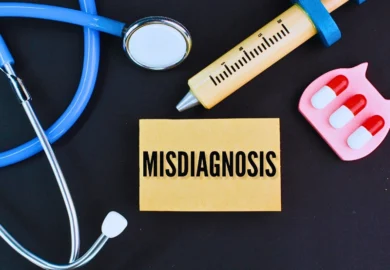A misdiagnosis becomes medical malpractice in Illinois if you are harmed due to a medical provider’s failure to meet the established standards of care. Common types of misdiagnosis that lead to lawsuits include failure to diagnose cancer, multiple sclerosis, stroke, and meningitis. Damages you can claim for medical misdiagnosis include medical expenses, lost income, physical pain and suffering, mental anguish, and loss of enjoyment of life.
Table of Contents

Medical malpractice cases have a higher burden of proof than general personal injury cases. They also have procedural rules that a plaintiff must follow. Navigating the medical and legal issues in medical malpractice cases can be an arduous task if you are working alone. A seasoned medical malpractice lawyer has the knowledge and resources to conduct a thorough investigation, carefully review medical evidence, and build a strong case. So, be sure to hire a lawyer soon after you discover that you or your loved one was misdiagnosed.
At Ankin Law, we have experienced medical malpractice lawyers who can help you hold the negligent medical provider accountable. Call 312-600-0000 for a free case review.
How Does Misdiagnosis Become Medical Malpractice?
Healthcare professionals must adhere to the approved medical standards of care when diagnosing ailments. A misdiagnosis occurs when a doctor’s actions deviate from these standards.
When you visit your doctor with a health complaint, the doctor will perform a “differential diagnosis.” That helps the doctor identify the specific health issue you have. Differential diagnosis involves:
- Asking questions about the symptoms you’re experiencing
- Inquiring about your medical history
- Performing lab tests
- Consulting other medical professionals
Various illnesses exhibit similar signs and symptoms. That explains why medical diagnoses carry inherent uncertainties. A medical practitioner must navigate a vast diagnostic landscape when diagnosing illnesses. Because of this, even the most qualified physicians may misdiagnose an illness. That said, lawsuits are reserved for doctors who ignore or fail to follow the accepted medical practices. In other words, they didn’t take the steps another doctor with similar training would have taken when diagnosing the same condition.
Ordering medical tests is a standard care guideline. Health professionals must follow it to accurately diagnose a health issue. A misdiagnosis stemming from a medical provider’s failure to order a medical test amounts to medical negligence.
When Delayed Misdiagnosis Becomes Grounds for Malpractice
Is it possible that your health condition could have been diagnosed earlier? Delayed misdiagnosis is one of the frequently reported medical issues. A serious consequence of a missed diagnosis is the delay in treatment. The misdiagnosed patients endure extended pain and suffering. The health condition worsens and may even lead to death.
Misdiagnoses are rarely intentional acts. Health practitioners are bound by oath to provide the highest standards of care. That ensures patients’ safety and recovery. Failure to follow the standard diagnostic procedures becomes medical negligence. In such a case, the diagnostic error becomes grounds for malpractice. You have the right to sue the doctor to recover the available damages.
There’s a gray area between acceptable misdiagnosis and those that amount to malpractice. An effective way to confirm whether you’re eligible to sue for a wrong diagnosis is to speak with a lawyer who handles medical malpractice cases. The lawyer will carefully investigate your case and consult a medical expert witness. The lawyer will then determine if you have valid grounds for a medical malpractice claim or lawsuit.
Common Types of Misdiagnosis That Lead to Successful Lawsuits
There are several types of misdiagnosis that commonly lead to a lawsuit.
Cancer Misdiagnosis
Early detection of cancers and tumors is critical for effective treatment. A medical provider can easily attribute the symptoms to a less serious condition. In other circumstances, the provider may downplay the symptoms. Such a case of misdiagnosis can cause the cancer or tumor to reach an advanced stage. The available treatment options become greatly diminished. That lowers the patient’s chances of survival. Cancer misdiagnosis often leads to successful lawsuits in Illinois, especially when victims demonstrate that the medical professional or provider did not meet the approved medical standards of care.
Misdiagnosis of Multiple Sclerosis
In most cases, multiple sclerosis (MS) is misdiagnosed as a neurological condition, such as Parkinson’s disease or Alzheimer’s. It may also be misdiagnosed as a mental health issue like depression. Accurate MS diagnosis requires a physician to perform a medical exam and order a brain scan.
Misdiagnosis of Stroke
One experiences a stroke when there’s a clot within the blood vessels. The clot blocks blood from reaching the brain. Misdiagnosis of a stroke is not an uncommon occurrence. Doctors often mistake a stroke for a migraine, low blood sugar, or seizures. Stroke misdiagnosis can have serious health consequences, including permanent nerve damage.
Misdiagnosis of Cardiac Problems
The symptoms of cardiac conditions, such as arrhythmia and heart attacks, vary widely. These symptoms match those of other conditions, such as anxiety, muscle strain, or indigestion. A doctor who fails to follow the accepted diagnostic procedures can misdiagnose a heart problem. A delayed heart disease diagnosis defers crucial life-saving treatment.
Lyme Disease Misdiagnosis
Bull’s-eye rash is the typical symptom of Lyme disease. However, not everyone suffering from Lyme disease exhibits this symptom. Other signs match those of flu, arthritis, fatigue syndrome, and depression. As a result, your doctor may misdiagnose it for any of these conditions.
Meningitis Misdiagnosis
Meningitis is caused by the inflammation of the meninges. Meninges are the membranes that line the brain and spinal cord. Delayed diagnosis of meningitis may accelerate the disease’s progression. Meningitis can cause rapid brain damage, loss of hearing, neck stiffness, and light sensitivity. It can become life-threatening if treatment isn’t administered on time. A doctor must perform a spinal tap and send the sample for lab testing to accurately diagnose meningitis.
Damages You Can Claim for Medical Misdiagnosis
Medical misdiagnosis victims can suffer a range of consequences. For example, their health issues may worsen, causing prolonged physical pain and suffering. It also leads to extended hospitalization and increased medical costs. In extreme cases, misdiagnosis may cause wrongful death. In fact, recent estimates show that diagnostic errors leave about 795,000 Americans dead or permanently disabled.
If you’ve suffered injuries and financial losses due to medical misdiagnosis, you have the right to pursue compensation. Available damages in a successful medical malpractice claim include:
Economic Damages
Economic damages refer to the financial expenses and losses you suffer as a result of the misdiagnosis. They are the actual costs you incur to seek medical care and other losses arising from your misdiagnosed illness. They include:
- Treatment costs captured on medical bills and receipts
- Estimated expenses for future medical care
- Physical rehabilitation and long-term care costs
- Lost income and wages
Non-Economic Damages
Medical malpractice claimants can also recover non-economic damages. these damages cover the physical pain and suffering you experienced due to the misdiagnosis. They include emotional distress, physical pain, loss of enjoyment of life, and mental anguish.
It’s difficult to assign a dollar value to such intangible elements of your losses. Partnering with a medical malpractice lawyer is the best way to ensure your claim or lawsuit will account for the full extent of your losses. A lawyer knows what evidence to look for when determining the claim value and proving misdiagnosis.
At Ankin Law, we help victims of medical misdiagnosis in Illinois pursue justice and reasonable compensation. Contact us to discuss your case with one of our skilled medical malpractice attorneys. We offer free initial consultations.
Frequently Asked Questions (FAQs)
How Long Do I Have to File a Medical Misdiagnosis Claim in Illinois?
Medical misdiagnosis claims are processed under the Illinois medical personal injury law. Under the state’s statutes of limitations, you have two years to sue a negligent medical provider. That window starts the date you discover or should have discovered you’ve been misdiagnosed. Determining when a delayed misdiagnosis becomes medical malpractice can be difficult for someone without legal knowledge. Always consult an attorney as soon as you suspect a delayed or inaccurate diagnosis.
How Much in Lawyer Fees Must I Pay to Pursue a Medical Malpractice Claim?
Filing a medical malpractice claim can be costly. There are legal documents to file. Your lawyer may need to handle numerous depositions. Additionally, the case may involve consulting other professionals to prove negligence. Covering all expenses related to these tasks can be challenging. That’s why most lawyers charge a contingency fee. You only cover lawyer fees after the attorney wins the case. Otherwise, you pay nothing.
Must I Go to Court When Pursuing a Medical Malpractice Claim?
You don’t need to go to court to recover compensation from a negligent medical provider. Most medical malpractice claims get settled out of court. Settlement agreements are reached through negotiations between your lawyer and the liable medical provider’s insurance company. Your lawyer will take your case to trial if the insurance company is uncooperative, denies your claim, or offers an unreasonable settlement.




